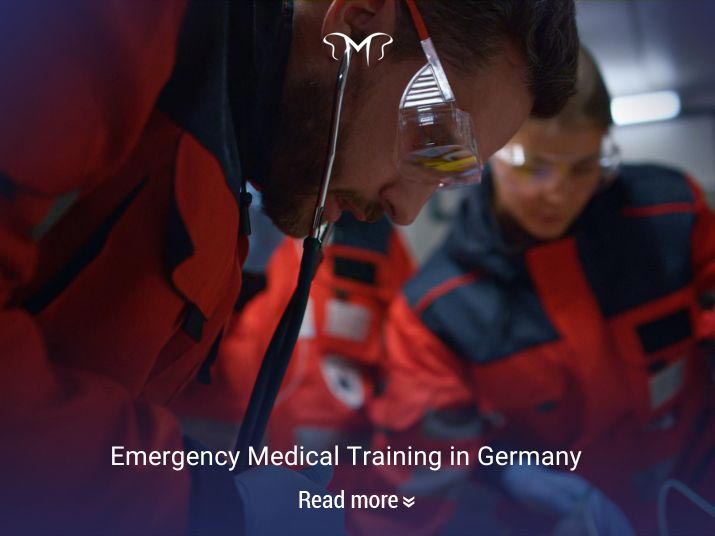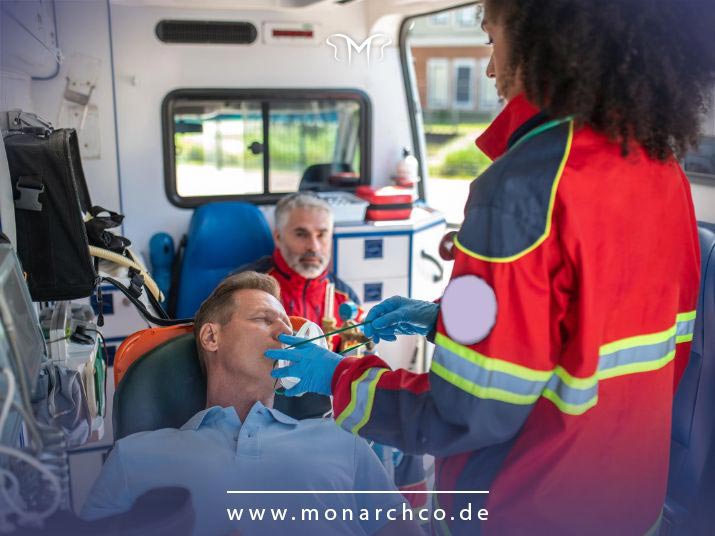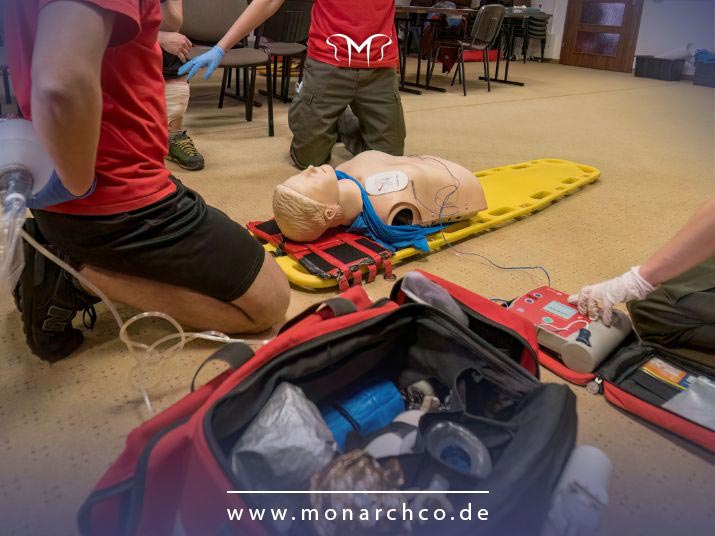
Emergency Medical Training in Germany
Emergency Medical Training in Germany is a training and skills course that provides those interested in this field with the opportunity to train and gain experience in the field of medical and rescue services. Various types of emergency medical training courses in Germany, such as emergency medical training for the elderly, emergency medical training, etc., give applicants the chance to study and gain the necessary skills to enter the German labor market without having a university education. As you know, Germany is one of the leading countries in the field of healthcare, and for this reason, it has defined a series of criteria and conditions for entering the emergency medical training course. In fact, the applicant must pass certain filters to enter these courses.
In this article from the website of Monarch Immigration Holding, we want to talk about these filters and conditions. If you are interested in learning more about emergency medical training in Germany or are planning to immigrate to this country, then do not miss this article.
The Role of Emergency Medical Technicians in Germany
Emergency medical technicians (EMTs) play a crucial role in providing urgent medical services in Germany. With specialized training, they shoulder a wide range of responsibilities. EMTs not only act as first responders but also play a key role in reducing fatalities caused by accidents. By offering timely pre-hospital care, they stabilize patients’ conditions and significantly increase survival rates for those affected. Thanks to their expertise and ability to manage emergencies and deliver immediate care, EMTs are considered indispensable assets in Germany’s healthcare system.
Requirements for Joining the Emergency Medical Training Program (Ausbildung) in Germany
The EMT training program (Ausbildung) in Germany offers an excellent opportunity for those seeking a career in healthcare, especially in emergency nursing, and aiming for a professional future in Germany. Interestingly, the entry requirements are quite similar to those for radiology training programs in Germany. Below are the key requirements:
-
A minimum educational qualification of a high school diploma (12 years).
-
Age requirement: between 16 and 27 years.
-
Proficiency in German language at a minimum of B1 level.
-
Full physical and mental health (no fear of dealing with critical patients or trauma cases).
-
A clean criminal record (submission of a background check is required).
These are the most essential conditions for entering the EMT training program in Germany. Candidates meeting these criteria can apply to join the program, earn their certification as an EMT in Germany, and begin their career. To evaluate your eligibility for these programs, you can fill out a consultation request form or contact our experts for guidance.
Duration of Emergency Medical Training Programs (Ausbildung) in Germany
Emergency medical training in Germany is divided into two main courses: emergency paramedic training and emergency nursing. The duration of each program is as follows:
-
Duration of Emergency Nursing Ausbildung (Rettungssanitäter): This program typically lasts 3 months, with trainees completing around 520 hours of theoretical and practical training.
-
Emergency Paramedic Ausbildung: This course spans 3 years, including 4,600 hours of combined theoretical and practical education.
If you're interested in working in Germany's healthcare sector, particularly in emergency medical services, these programs could be an excellent choice for you.

Roles and Responsibilities of Emergency Medical Technicians in Germany
As mentioned, graduates of emergency medical training programs hold vital roles within Germany’s healthcare system and have significant responsibilities. Due to the demanding nature of the job, this profession is considered one of the more lucrative training fields in Germany. The primary duties include:
-
Assessing Patients and Injured Individuals: EMTs, especially those in emergency departments, must promptly evaluate patients' conditions and identify their immediate needs.
-
Performing Initial Emergency Procedures: This includes CPR, managing blood pressure and bleeding, and other critical interventions.
-
Transporting Patients: Ensuring the safe transfer of patients to medical facilities while maintaining their physical and mental stability.
-
Managing Emergency Scenes: Trained EMTs must handle emergency situations effectively and collaborate with other team members.
-
Documenting Patient Records: Maintaining accurate medical records and documentation for patients and injured individuals.
If you’re interested in pursuing a career in emergency medical services in Germany, note that the job requires working different shifts, handling high-stress situations, and maintaining excellent physical and mental health.
Income and Job Market for Emergency Medical Services in Germany
The demand for EMTs in Germany is high due to the increasing need for healthcare professionals, particularly in emergency nursing. The challenges of the job are balanced by the satisfaction of helping others and earning a competitive income.
-
Average annual salary: €189,848.
-
Annual bonuses: Approximately €11,714.
Earnings depend on factors like experience, education, work location, and job responsibilities. Alongside competitive compensation, the growing demand for healthcare workers, driven by Germany’s aging population, is expected to continue for the next decade. It’s estimated that Germany will need around 270,000 nurses and healthcare professionals within the next ten years, motivating the government to introduce initiatives for recruiting foreign workers.

Documents and Requirements for Starting an EMT Ausbildung in Germany
To enroll in emergency medical training programs in Germany, applicants must provide the following:
-
A completed and signed application form for emergency medical services training.
-
An original high school diploma and its official German translation.
-
Certified translations of academic transcripts into German.
-
Proof of German language proficiency (e.g., Goethe B2 level).
-
A medical certificate confirming physical and mental health.
-
A criminal background check certificate.
-
A motivation letter explaining your interest and intent to participate in the program.
-
A professional resume, if available.
Meeting these requirements allows candidates to embark on a rewarding career in emergency medical services in Germany.
Job Opportunities for Graduates of Emergency Medical Training Programs in Germany
After completing the emergency medical training program (Ausbildung) in Germany, graduates will have access to a variety of exciting career opportunities, similar to those available for graduates of elderly care training programs in Germany. Emergency medical training is considered one of the most popular career paths in Germany, offering opportunities in the following areas:
1. Working in Emergency Centers
Graduates can work as emergency medical technicians in emergency centers, providing first aid and transporting patients to hospitals and medical facilities.
2. Hospitals
Graduates can find employment in various hospital departments, including emergency wards, intensive care units, and internal medicine departments.
3. Clinics and Medical Centers
Emergency medical training graduates can work in clinics and medical centers that require immediate medical care services.
4. Teaching and Consulting
Those interested in teaching or consulting can work at institutions that train others in lifesaving skills and emergency response.
5. International Organizations
Graduates with emergency medical training can apply to organizations like the Red Cross or Doctors Without Borders to provide medical services in crisis-affected areas worldwide.
Benefits and Challenges of Working in Emergency Medical Services in Germany
Benefits
-
High Job Security: Due to the increasing demand for EMTs in Germany, graduates enjoy strong job stability.
-
Opportunity to Save Lives: One of the greatest rewards is the ability to help others and save lives during emergencies, providing deep personal satisfaction.
-
Dynamic and Challenging Role: EMTs face new challenges daily, requiring quick decision-making and keeping the role engaging and fulfilling.
-
Competitive Income: Emergency medical professionals typically earn good salaries, which, combined with Germany's high standard of living, make it a desirable career path.
Challenges
-
Irregular Working Hours: EMTs often work night shifts, holidays, or unconventional hours, which can affect personal life.
-
High Stress and Emotional Pressure: Handling distressing and high-pressure situations can lead to significant emotional and mental strain.
-
Risk of Physical Injury: Working in emergency scenarios carries risks of physical harm and exposure to contagious diseases.
-
Stress Management: The role demands strong stress-management skills, which can be challenging for many individuals.
For those who enjoy helping others and can handle high-pressure environments, a career in emergency medical services in Germany can be highly rewarding.
The Role of Emergency Services in Germany’s Healthcare System
Emergency medical services are a cornerstone of Germany’s healthcare system, providing immediate assistance to individuals in critical conditions. These services involve a network of organizations and professionals working together to respond swiftly and effectively to urgent medical needs.

Future Career Prospects for EMT Graduates in Germany
Germany offers promising career prospects for EMT graduates, driven by strong economic conditions, governmental support for healthcare workers, and a high demand for medical staff, particularly in emergency and nursing roles. The country is facing a growing shortage of healthcare professionals due to an aging population. This has prompted the German government to implement initiatives to attract foreign specialists.
In the coming years, Germany is expected to need approximately 270,000 additional healthcare professionals, making it a prime destination for EMTs and nurses seeking employment.
Final Thoughts
Emergency medical training in Germany has become increasingly popular, attracting numerous international applicants, including many from Iran. This article has provided an overview of the program, its duration, responsibilities, career prospects, benefits, and challenges. For further details on emergency medical training or free nursing migration to Germany, feel free to contact us through the provided numbers and take advantage of the remaining opportunities.
FAQs
1. What are the main responsibilities of EMTs in Germany?
Evaluating patients, performing initial emergency procedures, transporting patients, managing emergency scenes, and documenting medical records are key responsibilities.
2. Which are the highest-paying Ausbildung programs in Germany?
Medical and paramedical fields, such as emergency medical services, are among the highest-paying training programs in Germany.
3. Where can applicants find support for joining medical training programs in Germany?
Organizations like Monarch Migration Holding provide expert guidance and offer free services for nursing migration to Germany, making the process smoother for applicants.


